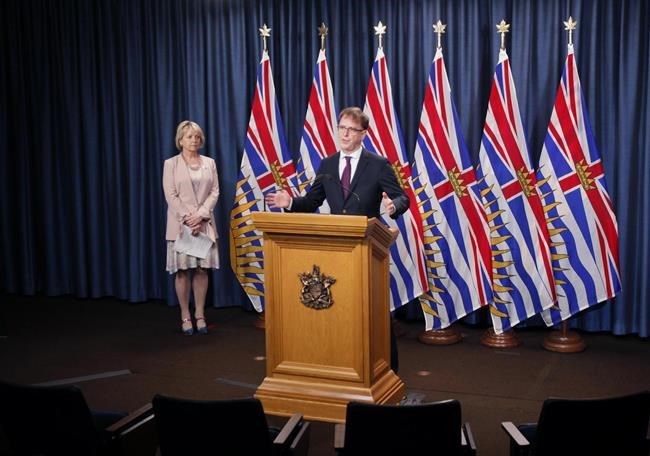VANCOUVER — Dangerously high COVID-19 cases that are rapidly increasing are forcing a temporary reversal of the restart plan in British Columbia's Lower Mainland, the province's top public health doctor told a rare weekend briefing on Saturday.
Dr. Bonnie Henry announced new bans relating to social gatherings, group fitness, workplaces and travel in the Vancouver Coastal and Fraser health regions.
The new rules are in effect for a two-week period beginning Saturday at 10 p.m. and ending Nov. 23 at 3 p.m.
"This will give us a chance to stop the transmission, to have a break in that rising transmission rate we are seeing," Henry said.
British Columbia recorded 567 new cases on Saturday for a total of 17,716 since the pandemic began. There are 100 in hospital, including 31 in critical or intensive care.
Under the new orders, most residents are restricted from having any social visitors to their homes, although Henry said individuals who live alone may still have their "safe six" over.
Weddings and funerals may proceed only with immediate households members present and receptions are prohibited whether at private residences or community venues.
Travel to and from the region is "strongly discouraged" unless it’s essential.
"Those who live outside these areas should not visit unless it is urgent or required or essential," Henry said.
Travel for sports to and from the region is prohibited, she said.
Group fitness activities that cause elevated heart rates indoors are to stop, including yoga, dance and spin classes. Recreation centres and businesses that run those activities can resume only when updated COVID-19 safety plans are in place with approval from local health officials, Henry said.
"These are venues where we see rapid spread of this virus even with people who don't recognize they are ill," Henry said.
Indoor sports and competitions where physical distancing cannot be maintained are suspended for the two week period.
Other indoor fitness activities, like one-on-one sessions at a gym or the use of individual workout equipment in ways that allow for adequate physical distancing are still permitted. Physical activities part of a school-based program can also continue, she said.
Workplaces, meanwhile, should make new efforts to ensure physical distancing and other COVID-19 safety protocols are followed.
Active inspections are being increased and businesses that do not comply will be subject to fines or ordered to close until they can comply, she said.
"If we cannot maintain those plans then local health officials will shut those businesses down," Henry said.
"In addition, we need to consider going back to actively supporting people working from home in certain businesses if that is possible."
Party buses and group limousines must stop operations too.
Henry said she makes public health orders only as a last resort, but in this case they are essential for schools and businesses to remain open.
It's important for essential services to remain open and without action that is in jeopardy, she said.
"We need everyone to help us keep this wall strong. We know that we need to redouble our efforts to protect our hospitals, our schools, our families, our communities and our elders," she said.
COVID-19 cases have moved from a linear growth rate, which was concerning but controllable, to exponential growth in the past two weeks, Henry said.
"We've started seeing a rapid increase in growth, so more exponential growth particularly focused in the Vancouver Coastal, Fraser health regions. That's the reason we're taking these additional actions to address that rapid transmission," she said.
The Central Coast and Bella Coola Valley, which both fall in Vancouver Coastal Health's jurisdiction, are excluded from the protocols.
"They are geographically quite different," Henry said, adding they align more closely with Interior Health.
This report by The Canadian Press was first published Nov. 7, 2020.
Amy Smart, The Canadian Press



